Experiența din Filipine: buștenii tăiați ilegal au fost transformați în 146.000 de scaune școlare
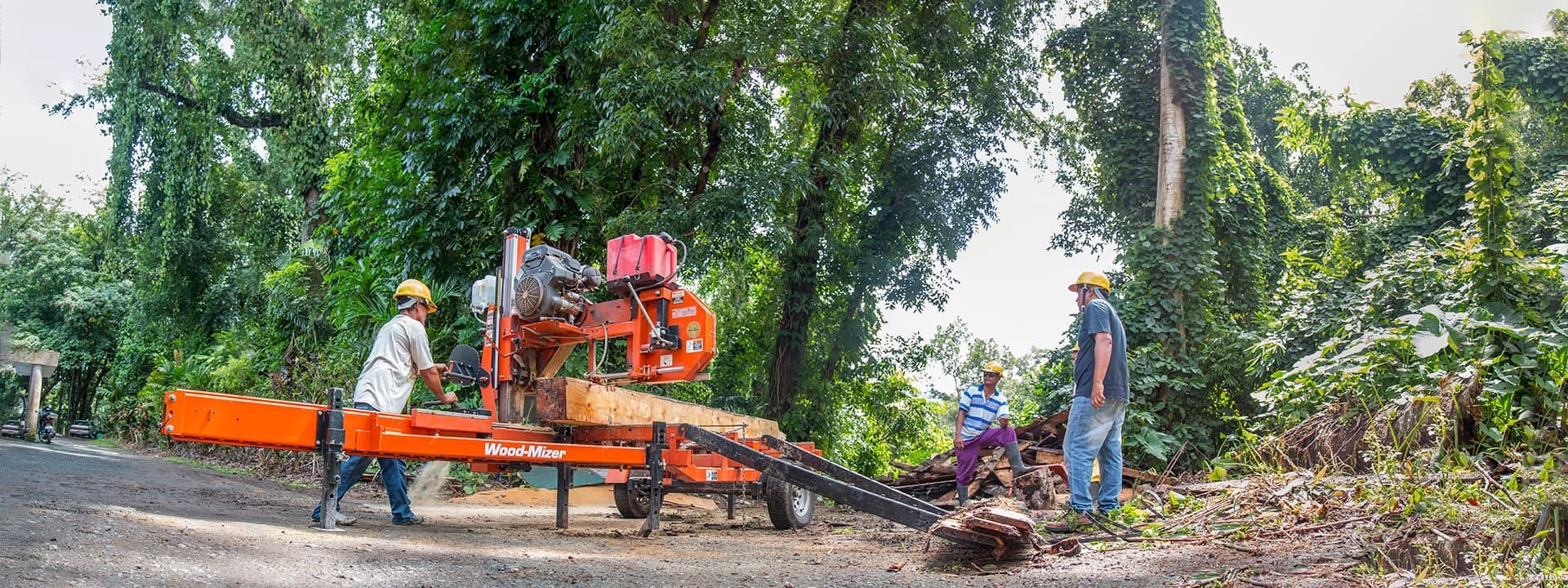
Există multe țări care încearcă să stopeze complet procesul tăierii ilegale de bușteni. Filipine a găsit o modalitate unică, creativă și economică de a rezolva problema, cu ajutorul fierăstraielor Wood-Mizer.
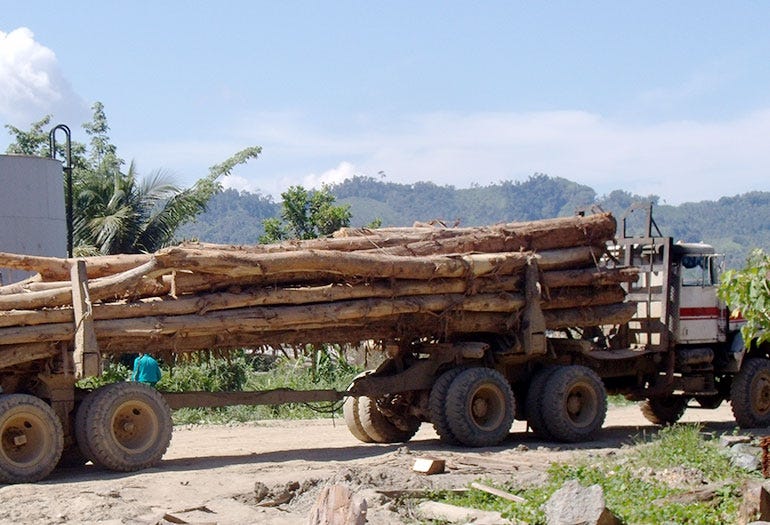

When logs are illegally felled and transported to other countries, this denies local Philippines the benefit of their own good timber.
Over the last few years, the Philippines has made great efforts to curb illegal logging. Aerial and water borne surveillance assist in determining where agents will make raids on suspicious activities, while road checkpoints target timber in transit. These activities have resulted in the confiscation of illegally-logged timber and the prosecution of those responsible.
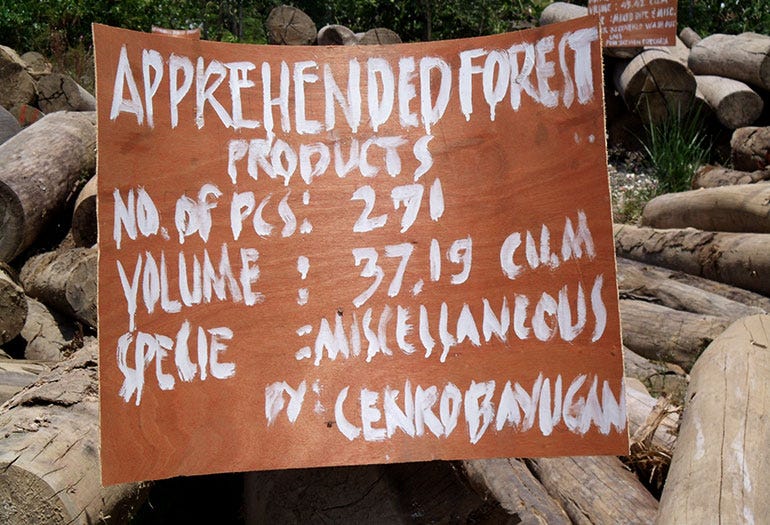

A pile of apprehended logs lies exposed to the element. Without a salvage plan, they would rot.
Through these raids and checkpoint stops, approximately 66000 cubic meters (28.5 million bd. ft.) of high quality timber was confiscated from 2010 to 2014 alone.
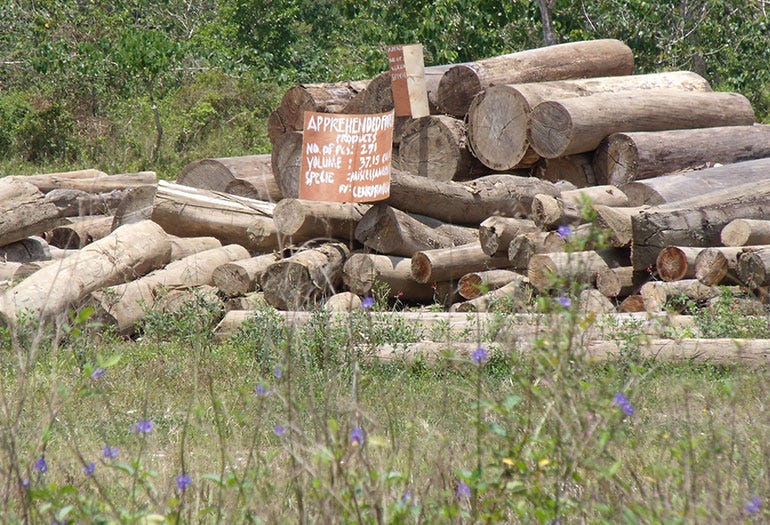

A pile of apprehended logs lies exposed to the element. Without a salvage plan, they would rot.
Confiscated timber was stored throughout the Philippines, usually not far from where it had been intercepted, in order to serve as evidence during legal proceedings. Once the legal requirements were fulfilled, officials were faced with a dilemma – what to do with the massive stockpiles of high quality timber scattered throughout the island nation before the wood eventually deteriorated?
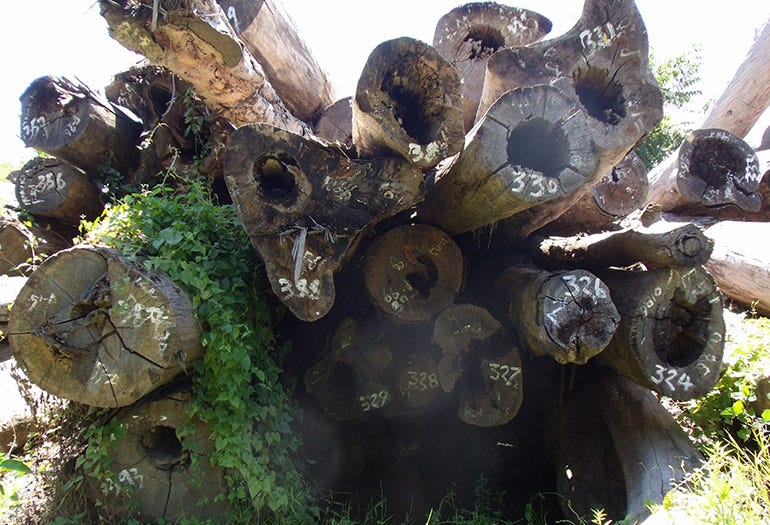

În secolul XX, Filipine și-a pierdut cea mai mare parte din suprafața împădurită, datorită exploatării forestiere excesive. Recent, guvernul a implementat noi politici care au reglementat defrișarea, dar pădurile rămase sunt încă amenințate de exploatările ilegale care au loc.
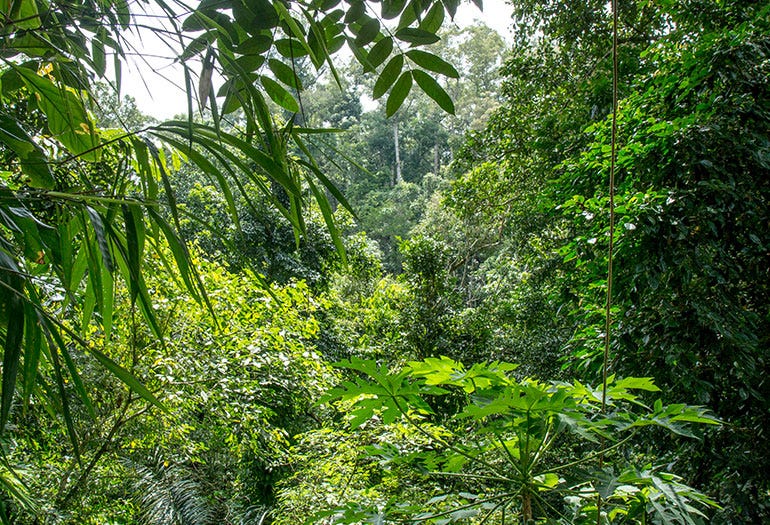

“I hope that the forest will once again become green, just like 50 years ago." Dr. Dwight Eusebio
And this is not a problem only confined to the Philippines. As countries worldwide in Asia, Africa and South America fight back against deforestation and illegal logging, the problem of what to do with the confiscated timber is a pressing issue. The whole point of anti-illegal logging programs is to preserve our resource for the future. So what about the timber already cut and intercepted? As officials in the Philippines watched these beautiful timbers rotting, they came up with an idea that the rest of the world would do well to pay attention to.
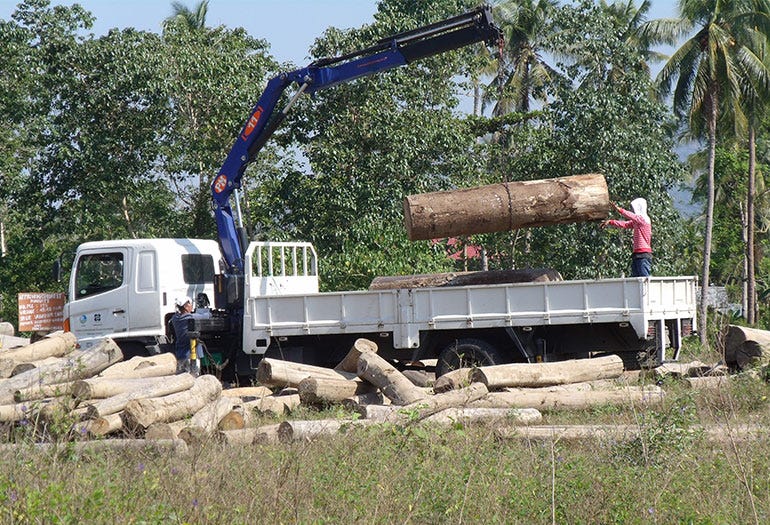

Atunci când buștenii sunt tăiați ilegal și transportați în alte state, filipinezii sunt privați de avantajele propriului lemn bun.
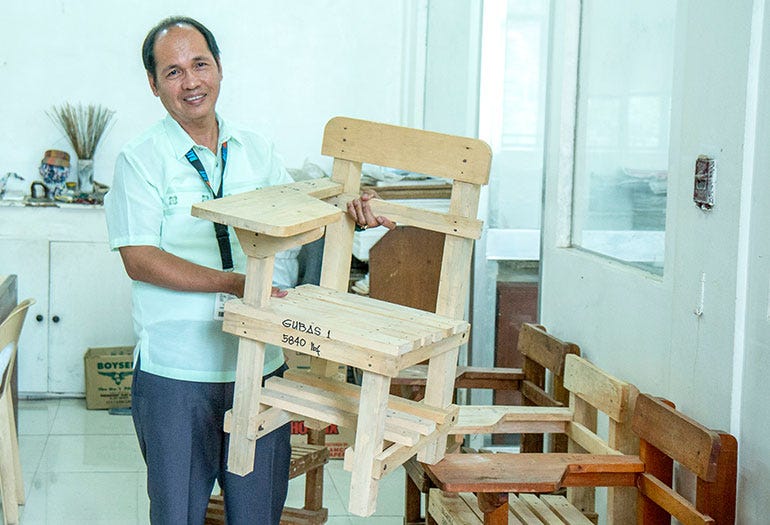

Dr. Dwight Eusebio demonstrates a finished chair.
The mission of DENR, TESDA, DepEd and PAGCOR was simple. They wanted to take the logs that had been confiscated, salvage them, mill them, and create school tables and chairs for local schools. They began by cutting the wood and sending it away to be refurbished, but eventually they were able to begin manufacturing the furniture themselves. It was a complete turnaround for the Filipino community. The Forest Products and Development Institute-Department of Science and Technology (FPRDI-DOST) was also tapped by DENR to convert confiscated logs into lumber and transported them to TESDA, Agusan del Sur.
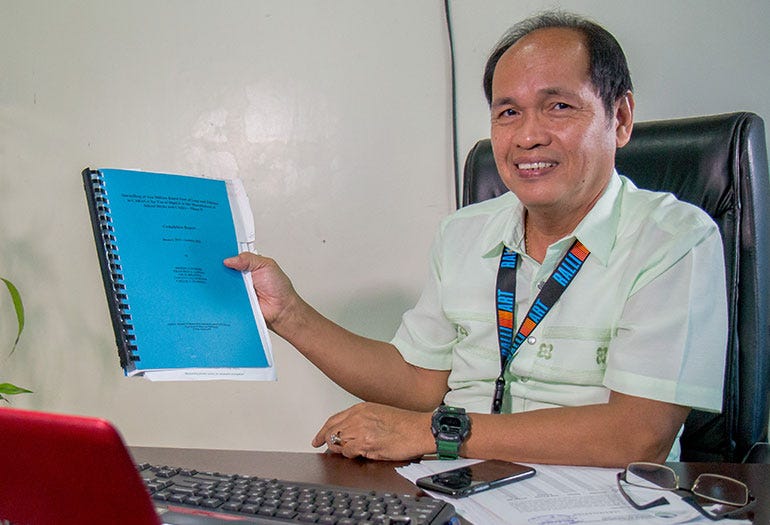

The report entitled: ‘Sawmilling of Ten Million Board Feet of Logs and Flitches in CARAGA for Use of DepEd in the Manufacture of School Desks and Chairs’
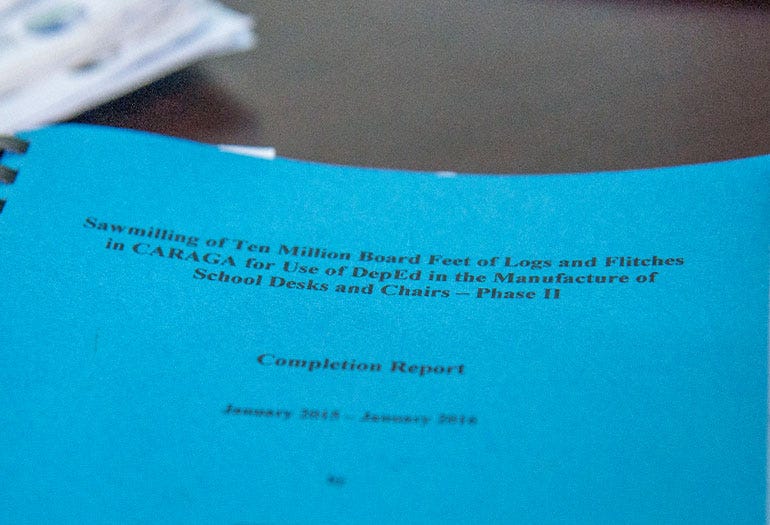

A collaborative project between DENR and FPRDI-DOST entitled: ‘Sawmilling of Ten Million Board Feet of Logs and Flitches in CARAGA for Use of DepEd in the Manufacture of School Desks and Chairs’
A collaborative project between DENR and FPRDI-DOST entitled: ‘Sawmilling of Ten Million Board Feet of Logs and Flitches in CARAGA for Use of DepEd in the Manufacture of School Desks and Chairs’ was implented. Ten million board feet is more than 23,000 cubic meters of wood! And this is just from the Caraga region of the Philippines – a fraction of the whole country.
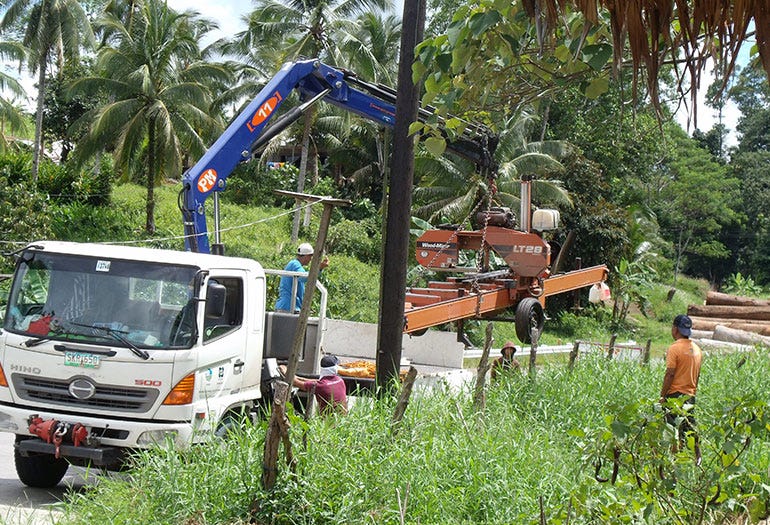

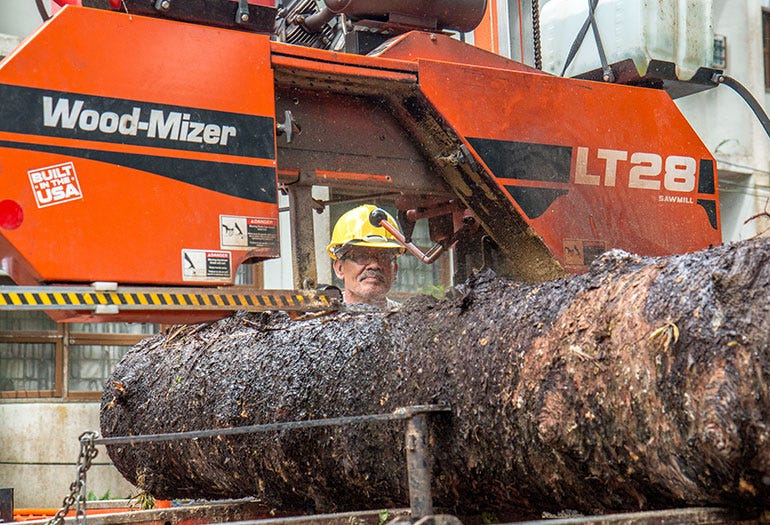

Wood-Mizer uses thin-kerf blade technology to reduce waste to the absolute minimum during the processing of logs into a finished product.
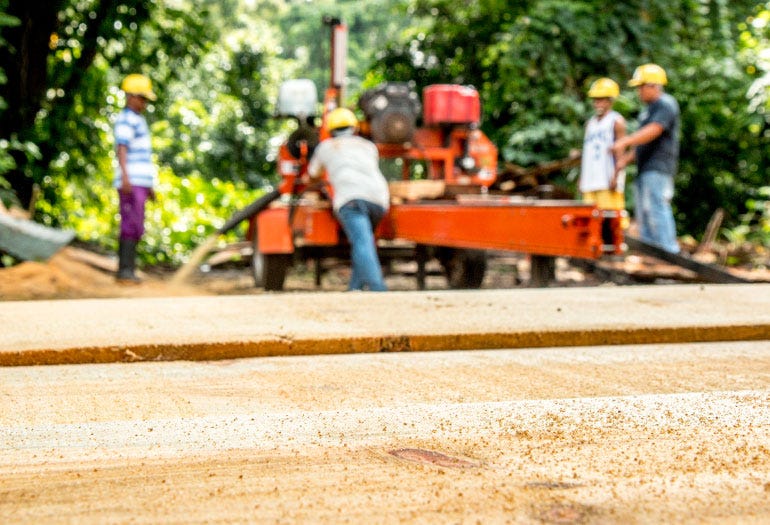

În ultimii ani, filipinezii au depus mari eforturi pentru a stopa exploatarea forestieră ilegală. Supravegherea aeriană și maritimă contribuie la stabilirea locurilor în care agenții întreprind raiduri asupra unor activități suspecte, în timp ce punctele de control rutier verifică transporturile de cherestea. Aceste activități au condus la confiscarea lemnului tăiat ilegal și la urmărirea penală a celor responsabili.
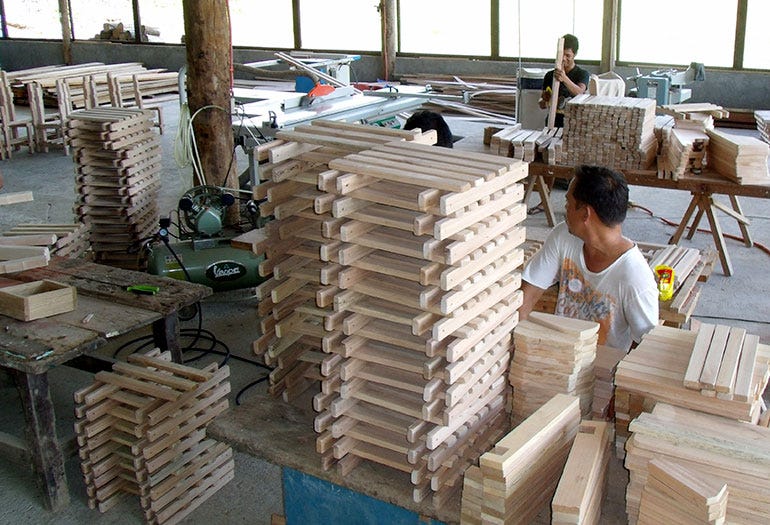

Workers convert illegally-logged timber into components for school desks and chairs.
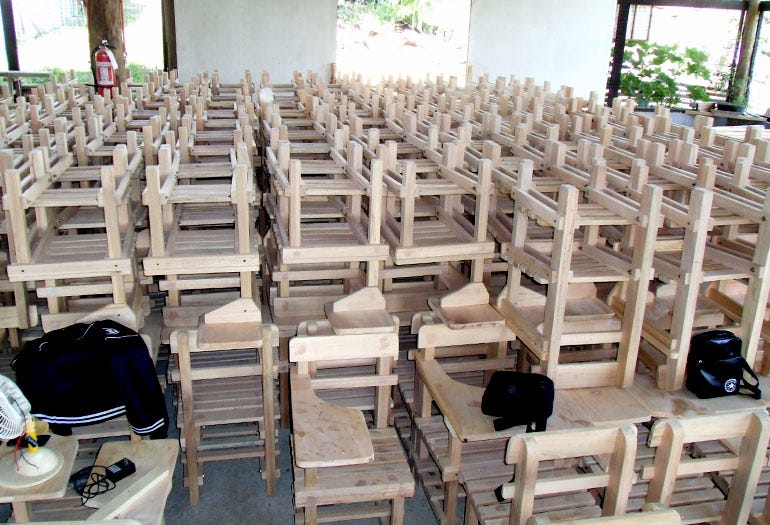

The woodworking shop bursting at the seams with high quality school desks and chairs, made from wood once destined for illegal profits.
But just how big of an impact did the project have on the environment? Consider this: the average 3,000 square-foot timber frame house takes around 15,000 board feet of timber to build. The project has already scaled that amount and cut nearly 4 million board feet of timber. With so much excess illegal wood, DENR and FPRDI-DOST have found a way to create a beneficial, economical, and rewarding purpose for the confiscated logs.
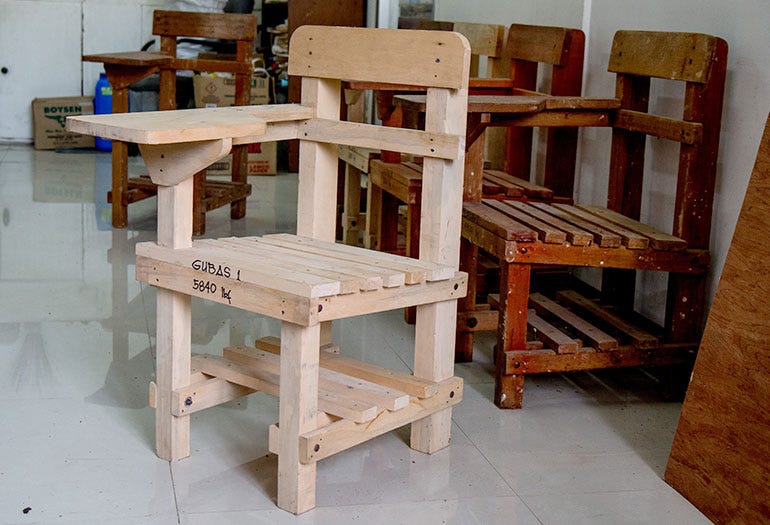

A finished school desk built to last for many generations of students.
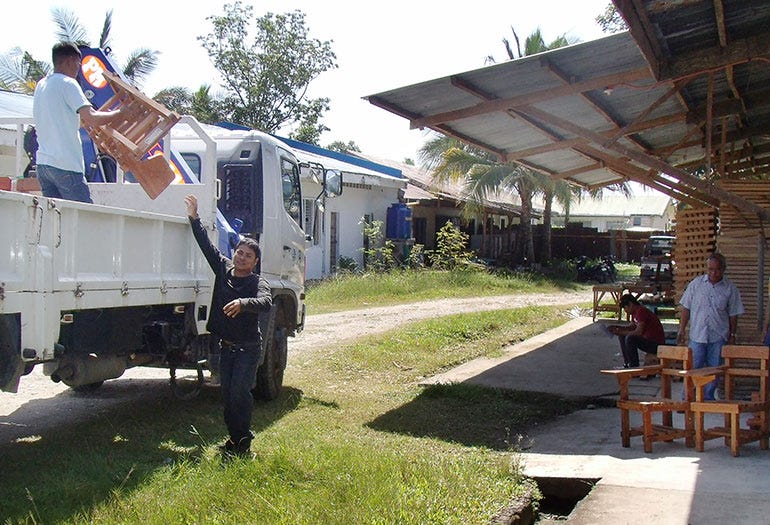

Prin aceste raiduri și puncte de control, aproximativ 66.000 de metri cubi de lemn de înaltă calitate au fost confiscați doar între anii 2010 și 2014.
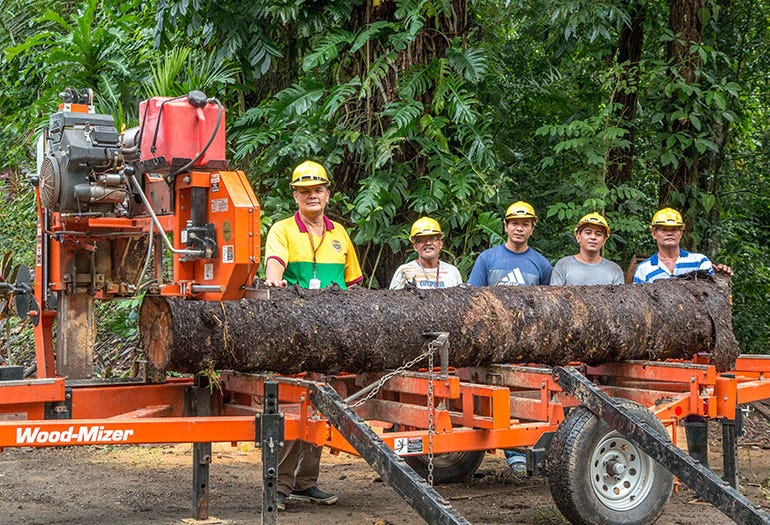

The use of 10 Wood-Mizer mobile sawmills allowed for salvage projects to take place anywhere in the Philippines.
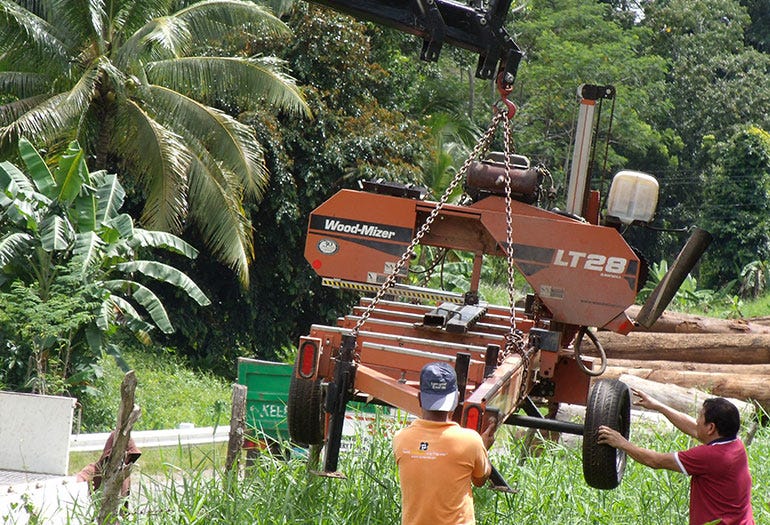

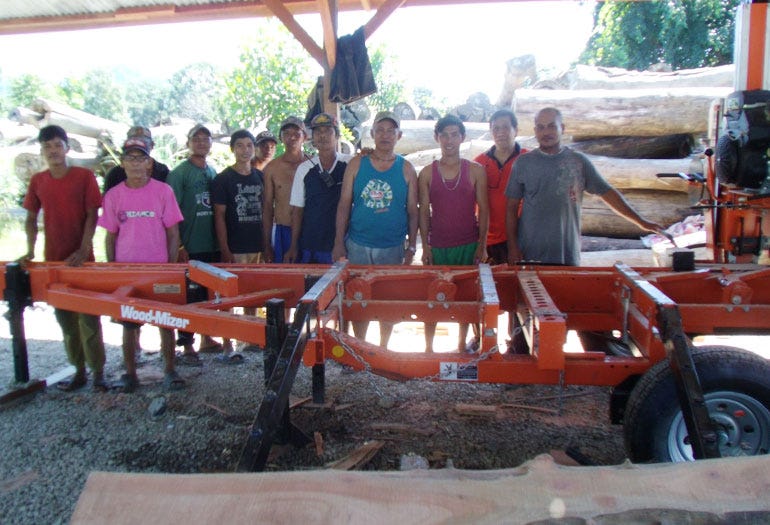

Cheresteaua confiscată a fost depozitată pretutindeni în țară, de obicei nu departe de locul unde a fost interceptată. Buștenii au fost păstrați în aer liber, expuși la ploaie și lumină excesivă, ceea ce a condus la putrezirea acestora. O astfel de resursă nu ar trebui să fie risipită astfel, tocmai prin măsurile impuse de guvern pentru a servi propriului popor.
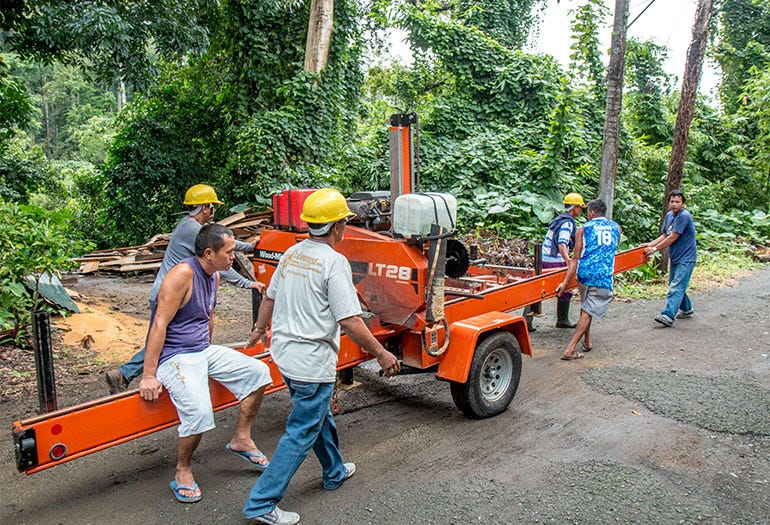

Oficialii s-au confruntat cu o problemă - ce să facă cu stocurile masive de lemn de înaltă calitate, împrăștiate pe toată insula, pentru a evita irosirea lor? Au venit cu ideea găsirii unei modalități de utilizare a acestor bușteni, direct pentru comunitatea filipineză.
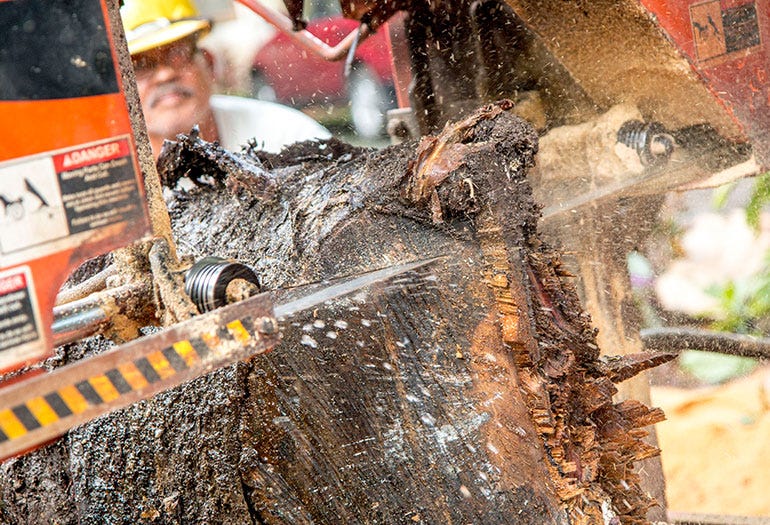

Wood-Mizer uses thin-kerf blade technology to reduce waste to the absolute minimum during the processing of logs into a finished product.
“In the new rules by KFS, saw millers licensed to cut trees in gazetted forests must use the Wood-Mizer machine as opposed to ordinary saws. KFS says the new machine produces more timber from a log than ordinary ones.” (http://www.the-star.co.ke/news/2016/04/22/sawmillers-unhappy-with-logging-rules_c1336655)
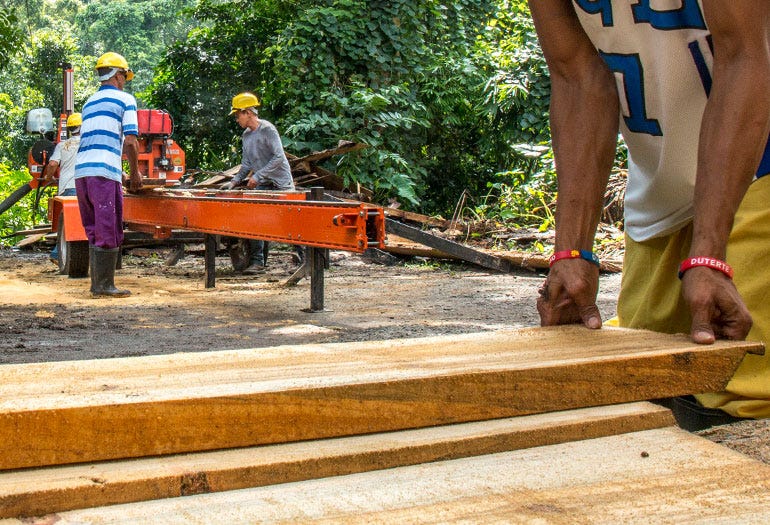

La vremea respectivă, școlilor publice din Filipine le lipseau cel puțin 2,5 milioane de scaune. Astfel, în 2010, a fost demarat un proiect prin care buștenii confiscați de stat puteau fi folosiți pentru a construi mobilier nou pentru școlile locale.
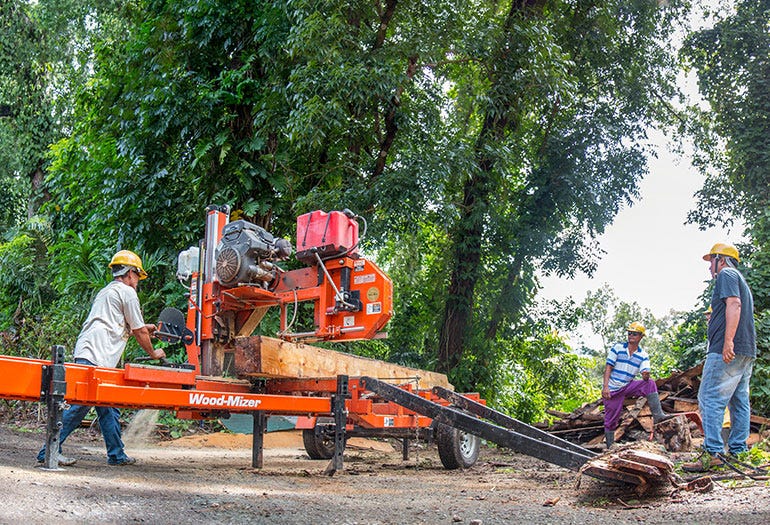

Better sawmill technology = a better outlook for forestry sustainability.
Eusebio concludes. “I hope that the forest will once again become green, just like 50 years ago. If you look at the statistics, it’s very sad to learn that we have very few forested areas left. But now the number is going back up because of the National Greening Program.”
After six years of nonstop processing of illegally felled trees and production of something better for the economy and the environment, the National Greening Program and DENR were able to work and not only build thousands of chairs and tables, but also find a way to grow and manage the forests around them.
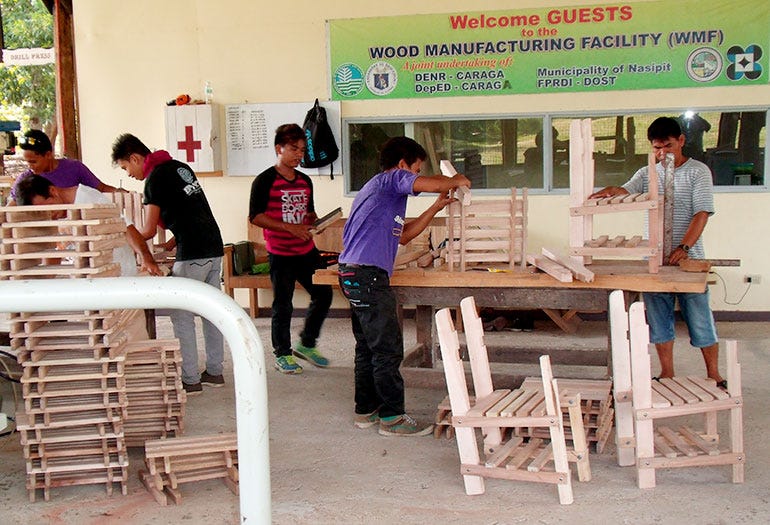

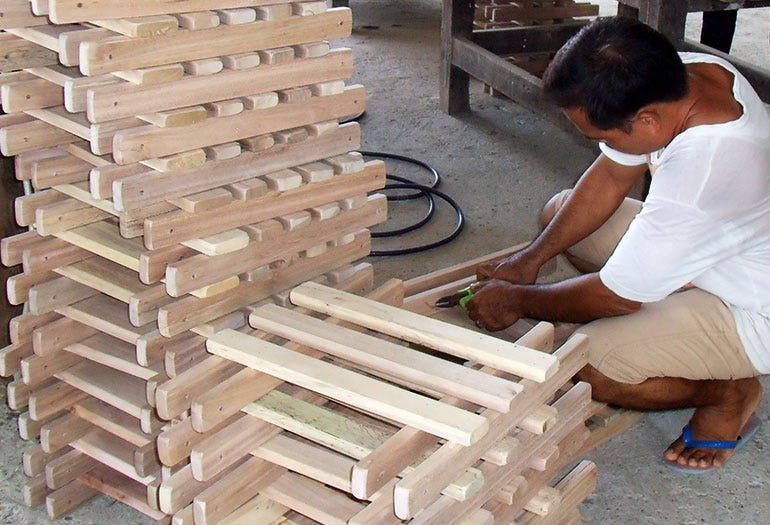

Din 2011 până în prezent, au fost produse peste 146.000 piese de mobilier școlar, iar 369 de școli au fost reparate folosind produse din lemn confiscat.
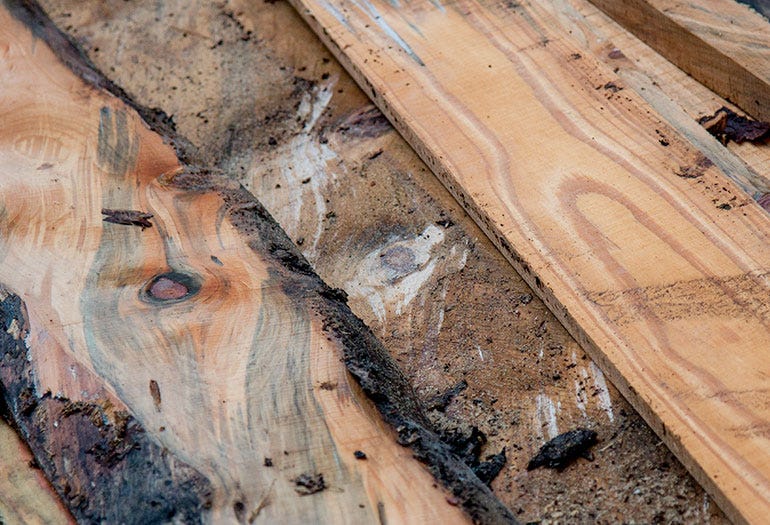

10 Wood-Mizer sawmills allowed the project to be successful in salvaging the millions of board feet of wood into high quality timber for the school desks.
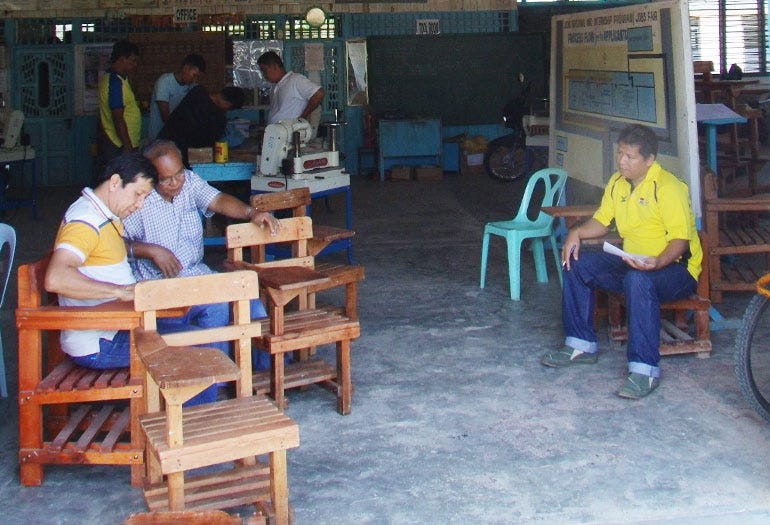

Workers convert illegally-logged timber into components for school desks and chairs.
Important to remember though is that many illegal loggers are not large corporations – they’re simple farmers or villagers who do not have many opportunities to generate income.
“A lot of illegal loggers are simple people who are mainly trying to feed their own children. Especially for our upland dwellers, wood is their source of income that allows their children to go to school.” shares Teodulfo Delgado, Engineer with the College of Forests & Natural Resources in Los Banos, Philippines. Hand-in-hand with enforcement of anti-illegal logging regulation needs to come provisions for better economic development.
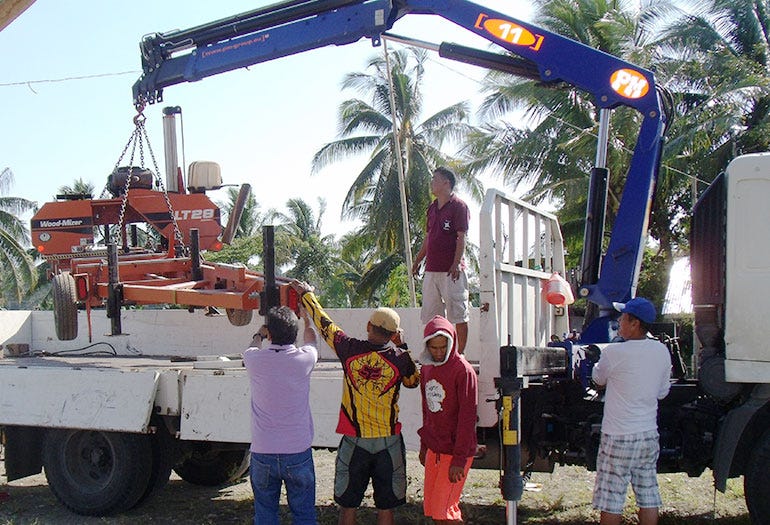

Înainte de începerea proiectului, echipa avea un fierăstrău. Cu toate acestea, după ce proiectul a fost conceptualizat, echipa a decis să cumpere încă cinci fierăstraie portabile Wood-Mizer. În prezent, funcționează zece fierăstraie Wood-Mizer, împărțite în întreaga țară. Fierăstraiele sunt transportate în locurile în care au fost depozitați buștenii tăiați ilegal după confiscare.
***

